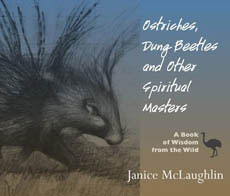Janice McLaughlin is a Maryknoll Sister from Pittsburgh who has lived and worked in Africa for 35 years. She is now president of the Maryknoll Sisters and based in Ossining, New York. In this innovative and enlightening work, McLaughlin picks up where Hildegard of Bingen — who famously said "The truly wise person kneels at the feet of all creatures" — left off.
Animals have valuable lessons to teach us if we will only stay alert and open. In Kenya, the author was given the butterfly as a totem, a guardian animal spirit, since she was always flitting from one place to another during her years in Africa. Indigenous people around the world seem to be well-tuned to the unique qualities of creatures of all kinds.
Each chapter in this paperback is organized around a description of an animal's behavior or traits, an experience drawn from this natural wisdom, quotations from Scripture, and a few questions and action suggestions. In Africa, according to McLaughlin, the buffalo, elephant, lion, and rhino are the most sought-after animals because they are dangerous, powerful, and fearless. She ties the buffalo to responsible leadership, the elephant to communication and community, the lion to playfulness and leisure, and the rhinoceros to stability.
As McLaughlin writes about the crocodile she sees him as a mentor of patience. He sits and waits until something comes his way rather than frantically searching it out. She recalls an African proverb which goes: "Slowly, slowly is the way forward." McLaughlin commends the dung beetle for perseverance and writes:
"If we want to make a difference in the world, we must be prepared to work hard and long. We cannot give up when we meet obstacles and hardships but, like the dung beetle, we must be prepared to try again and again until we succeed. 'A path is made by walking the same way many times,' says a Tonga proverb. Can we persevere and make new paths to a better world for all?"
In her discussion of the impala (an antelope), the author sees it as an animal who models for us openness to change. Then she notes:
"The Shona people of Zimbabwe have many names for God. My favorite is Chipindikure, 'the One who turns things upside down.' It comes from the root kupinduka, which means to be uprooted. What an amazing concept to explain God's presence in the often unwanted and unplanned changes that happen to us throughout our lives! These can bring many blessings if we are open to the invitation to change, or they can make us miserable if we resist."
It is these kind of passages which make this an exhilarating book to read and to savor with its amphibian insights into the animal kingdom and human communities.
